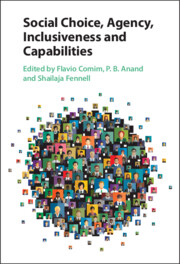Book contents
- Social Choice, Agency, Inclusiveness and Capabilities
- Social Choice, Agency, Inclusiveness and Capabilities
- Copyright page
- Contents
- Figures
- Tables
- Contributors
- Preface and Acknowledgements
- 1 Introduction: social choice, agency, inclusiveness and capabilities
- Part I Social Choice and Capabilities
- 2 The many facets of social choice theory
- 3 Beyond capabilities?
- 4 Examining the challenge of communication in diffusing innovative education programmes
- 5 Nudging the capabilities for a sustainable city?
- 6 Social choice and research capacity strengthening in Nigeria
- Part II Inclusiveness, Social and Individual Agency
- Part III Social Choice and Capabilities in Action
- Index
- References
2 - The many facets of social choice theory
from Part I - Social Choice and Capabilities
Published online by Cambridge University Press: 28 March 2024
- Social Choice, Agency, Inclusiveness and Capabilities
- Social Choice, Agency, Inclusiveness and Capabilities
- Copyright page
- Contents
- Figures
- Tables
- Contributors
- Preface and Acknowledgements
- 1 Introduction: social choice, agency, inclusiveness and capabilities
- Part I Social Choice and Capabilities
- 2 The many facets of social choice theory
- 3 Beyond capabilities?
- 4 Examining the challenge of communication in diffusing innovative education programmes
- 5 Nudging the capabilities for a sustainable city?
- 6 Social choice and research capacity strengthening in Nigeria
- Part II Inclusiveness, Social and Individual Agency
- Part III Social Choice and Capabilities in Action
- Index
- References
Summary
The theory of social choice is very rich in topics and issues that have been discussed since Kenneth Arrow’s seminal contribution in 1951. This keynote chapter is only able to deal with only a few of them. The start is Arrow’s impossibility theorem, two routes that escape from this negative result and the issue of whether there are some properties that should be satisfied by every aggregation rule in order to qualify as desirable. Next, the literature on individual liberty and rights is related to the notion of freedom in the sense of control over one’s functioning bundle. Then the procedural aspect of individual and collective choice, often mentioned but not worked out in detail, is discussed. Finally, a particular approach to measure and compare capability sets is proposed.
Keywords
- Type
- Chapter
- Information
- Social Choice, Agency, Inclusiveness and Capabilities , pp. 17 - 41Publisher: Cambridge University PressPrint publication year: 2024

